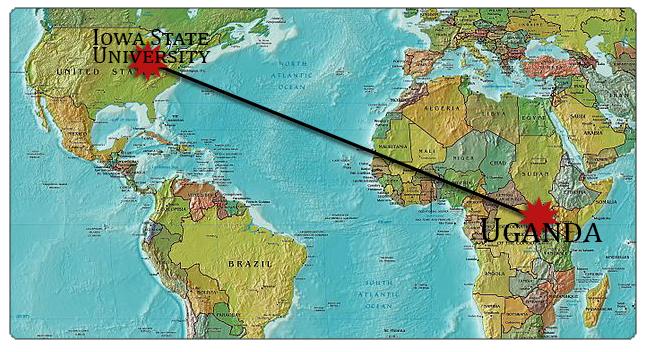Editorial: University should support experiential learning
August 29, 2013
For five weeks every summer, ISU students can be found winnowing amaranth, building tip-taps, and digging sweet potato mounds in the fields and gardens of Uganda, fostering an appreciation for agriculture without borders.
The Uganda Service Learning Program is second to none at Iowa State, providing students and faculty with the opportunity to work alongside undergraduates from Makerere University, in the Kamuli District of Uganda. Students have been making the trip for nearly eight years, promoting intercultural understanding between Iowans and Ugandans and nurturing unique binational projects between two outstanding universities.
All while being 100 percent donor-funded.
This is an experiential learning program Iowa State should be proud of, as it puts into practical use the technical skills the university takes particular pride in emphasizing.
Iowa State needs to place more focus on the Uganda Service Learning Program and begin to fund other similar experiential programs, as it not only empowers students to actually use their newly developed skills in agriculture, but reflects the university’s passion for development and dedication to sustainable agricultural practices.
According to Global Professor and co-leader of the program Gail Nonnecke, the Uganda Service Learning trip has two main purposes.
First, the program is designed to enhance agricultural knowledge among young people living in the Kamuli district. These young Ugandans typically have a very negative view of any agricultural work, and many consider it to be a sign of poverty to work as a farmer or gardener. It is the job of ISU students to show them that agriculture can be a great business opportunity — and a livelihood to take pride in.
And who better to share their wealth of agricultural knowledge than ISU students?
These students act as teachers and leaders of agriculture in Uganda, and for them, the benefits of the program are equally as tangible. Students participating in the trip have the opportunity to actively practice in development work, using their technical skills in a slew of agricultural topics, from agronomy to food science.
This is an opportunity which Iowa State should not ignore; the university needs to begin providing financial support for this program, as well as offer more publicity for similar programs throughout the university, in order to truly provide the experiential learning education from which students will benefit the most.
Working with tropical agriculture to solve problems of sustainability, from local farming projects to school gardens, results in “unbelievable” improvements in students’ ability to problem-solve, Nonnecke said, as well as dramatic increases in technical knowledge and skill sets.
By the end of the program, Nonnecke said, “students are able to independently provide solutions to complex problems regarding sustainability” and have made impressive transformations into being more globally oriented people.
Growing in size from fewer than 20 participants to more than 50 students and faculty members in total, the Uganda Service Learning Program has proven to be a great experience for students wanting to supplement their theoretical knowledge with unparalleled hands-on experience and international exposure.
But because it is entirely funded by financial gifts, the program is unlikely to expand to other countries anytime soon.
“We’d be so happy to have similar programs in different parts of the world,” said Dorothy Masinde, co-leader of the program, “but the main concern we have is financial resources.”
As a world leader in agriculture, and an institution which emphasizes the development of practical skills in fields of science and technology, there is no question that this is the kind of hands-on program in which Iowa State needs to provide more publicity, as well as increased financial attention.

















